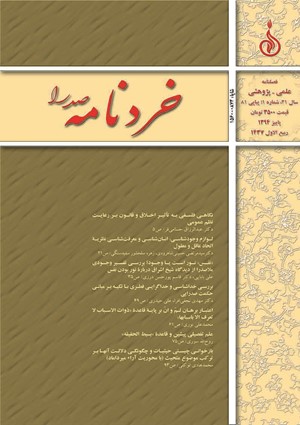لوازم وجودشناختي، انسانشناختي و معرفتشناختي نظرية اتحاد عاقل و معقول
محورهای موضوعی : ملاصدراپژوهی و اندیشۀ حکمت متعالیه
سيدمرتضي حسيني شاهرودي
1
![]() ,
زهره سلحشور سفيدسنگي
2
,
زهره سلحشور سفيدسنگي
2
1 - دانشگاه فردوسي مشهد
2 - دانشگاه فردوسي مشهد
کلید واژه: اتحاد عقل معقول نفس ملاصدرا ,
چکیده مقاله :
مسئلة اتحاد عاقل و معقول يكي از مباحث مهم در فلسفة اسلامي است. سابقة اين اصل در فلسفة اسلامي به ترجمة كتاب اثولوجيا بازميگردد و صدرالمتألهين آن را بمدد اصول فلسفي خود ـ همچون اصالت وجود، تشكيك وجود و حركت جوهري نفسـ تبيين كرده است. ملاصدرا حصول علم براي نفس را مانند پيدايش صورتهاي جسماني براي ماده ميداند؛ نفس با صور علمي خود متحد ميگردد، آنچنانكه ماده و صورت با يكديگر متحدند. او با اثبات اتحاد عاقل و معقول، نظرية جديدي در وجودشناسي، انسانشناسي و معرفتشناسي عرضه كرد و از اين رهگذر براي معضلات و پرسشهاي فراروي فيلسوفان مسلمان، پاسخهاي جديدي فراهم آورد. در پرتو اين اصل است كه وي تبيين فلسفي نويني از مسائلي چون استكمال و اشتداد وجودي نفس، تجسم اعمال، عقل بسيط، تجرد فوق عقلي نفس، اتحاد نفس با عقل فعال و مسائل مربوط به وجود ذهني ارائه ميدهد.
The principle of the union of the intellect and intelligible is one of the important discussions in Islamic philosophy. The background of this principle in Islamic philosophy goes back to the translation of the book Uthulugia, and Mulla Sadra explained it based on some of his own philosophical principles such as the principiality of existence, gradation of existence, and the trans-substantial motion of the soul. He considers knowledge acquisition by the soul to be similar to the emergence of corporeal forms for matter. The soul unites with its cognitive forms in the same way that matter and form unite with each other. Through demonstrating the union of the intellect and the intelligible, Mulla Sadra presented a new theory of ontology, anthropology, and epistemology and, in this way, provided some new responses to the problems and questions before Muslim philosophers. It was in the light of this principle that he presented a new philosophical explanation for some problems such as the ontological perfection and gradation of the soul, embodiment of acts, the simple intellect, supra-intellectual immateriality of the soul, the unity of the soul with the active intellect, and the issues related to mental existence.
